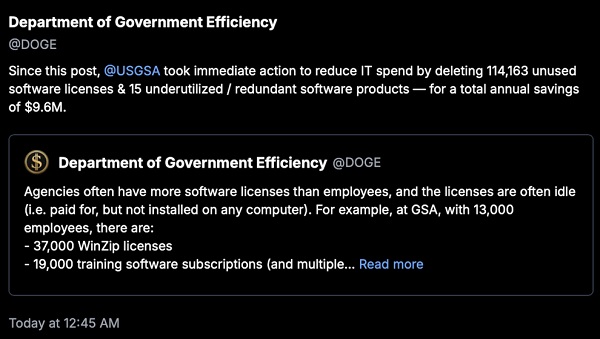From The Center Square
The Trump administration’s all-of-Washington shake-up has resulted in hundreds of lawsuits and cries of a “constitutional crisis,” with Elon Musk’s Department of Government Efficiency at the heart of many complaints from Democrats.
Critics of the department say its on shaky legal footing and have questioned whether Musk’s role violates the U.S. Constitution, as higher-ranking government officials often must be appointed by the president and confirmed by the Senate. The White House has maintained that, despite Musk being the public face of the department and seemingly directing its activities, he is only a “special government employee.” As such, he isn’t subject to a Senate confirmation.
But legal experts disagree on Musk’s role and authority within the federal government.
The Pacific Legal Foundation’s Michael Poon works for the foundation’s separation of powers practice group. Now that the White House has revealed the identity of the DOGE’s administrator as Amy Gleason, a healthcare technology executive who served under Presidents Donald Trump and Joe Biden, Poon likened Musk’s role to that of a “DOGE czar,” or even the president’s chief of staff – neither of which are senate-confirmed positions. Because Musk isn’t the department’s administrator, he doesn’t seem to have any formal authority, according to Poon.
“Agency heads have the power to ignore him because he doesn’t actually have formal power himself,” Poon continued, “but they probably listen because Musk is understood to have the president’s confidence,” similar to other positions Poon mentioned, including Trump’s border czar, Tom Homan, who also isn’t Senate confirmed but works side by side with the Department of Homeland Security. whose secretary, Kristi Noem, is Senate-confirmed.
“This kind of arrangement makes Musk informally powerful, but the power comes from the expectation that the president would back him, not any power that is, sort of, inherent in his position,” Poon said.
While Poon doesn’t think Musk’s role violates any constitutional requirements, he does appreciate the sudden interest the public is taking in the role of unelected federal officials in general. But since their function in the federal government has developed over many decades, it’s unlikely that anything resulting from the DOGE-Musk controversy would go very far in solving the problem.
“It’s appropriate to be scrutinizing of unelected officials and the power that they wield,” Poon said. “But it’s a concern that has been put to the side for the last hundred years, over which both major parties have worked to weaken these protections against unelected officials.”
If Americans want less power and more guardrails for unelected officials, it will take time to achieve, according to Poon.
“I don’t think that, as the current case law stands, Elon Musk’s role contravenes the Constitution, but if we think those protections should be strengthened… that’s something that takes a concerted effort and it can’t vary depending on who is in control of the executive branch,” Poon said.
Thomas Berry, director of the Cato Institute’s Robert A. Levy Center for Constitutional Studies, finds the lack of transparency around DOGE and Musk’s role troubling.
“I think there’s very serious concerns about what exactly is happening with DOGE,” Berry said.
A lot of concerns with DOGE have to do with the Appointments Clause, which is the basis for Senate confirmations of presidential appointees and creates a system of accountability.
“The Appointments Clause of the Constitution says that the final decision maker on a lot of issues needs to be either the president or someone appointed by the president and confirmed by the Senate,” Berry said. “When the public perception is that Musk or anyone who’s not Senate-confirmed is making these decisions, you don’t have any elected person to blame.”
Even if the administration were to eventually reveal that the president approved all of Musk’s actions, the lack of transparency now is problematic for the public, according to Berry.
As for questions about Trump’s authority to establish DOGE and Musk’s role within it, President of the Liberty Justice Center Jacob Huebert thinks they’re unfounded.
“Article II of the Constitution gives all executive power to the president,” Huebert said. “As long as the president has ultimate decision-making authority here, I don’t see any problem with that.”
He applauds what he sees as Trump’s revision of the executive branch, bringing it closer to what it was intended to be.
“It’s the president deciding how the executive branch is going to run, which is very much the opposite of how it has long been run, where the bureaucracy is kind of leading things even though the bureaucracy doesn’t have any constitutional authority whatsoever,” Huebert said.
As far as Trump’s efforts to cut government spending through DOGE, Huebert’s unsure how it will play out, though he thinks it’s a valiant aim. The Constitution grants Congress power over the government’s purse, and some lawsuits are challenging the president’s attempts to cut spending that Congress has already appropriated. Even if DOGE were able to get federal agencies to cut their budgets and the courts ruled in their favor, Huebert thinks it will be difficult to motivate Congress to pass significantly smaller budgets.
“That to me seems like the biggest challenge for DOGE if part of the goal is to cut spending because Congress really likes to spend, including most of the Republicans in Congress, and the reasons that they’ve had to spend so much money have not gone away,” Huebert said. “All the incentives to spend, or most of them, are still there. So I don’t know how Trump or Elon Musk, if they want to bring it under control, can bring it under control.”

















